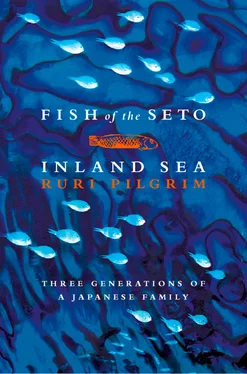The front gate of the Shiraisâ was wide open. Yasuharu was to enter the house from the formal open porch and not through the back entrance. The eldest son was the next important person to Tei-ichi in the family and Kei made sure that all the formalities were observed. The members of the household gathered at the front porch to welcome him home. Tei-ichi stayed in his study.
When Yasuharu went in to greet his father, Tei-ichi said, âOh, is it you?â and, as though he had just remembered that his son was coming home, turned round from his open book. âHow are you? You look well.â
âThank you, otohsan. I am very well. I am glad you are keeping well, too.â
After formal exchanges, Tei-ichi released Yasuharu saying, âYou must be tired after your long journey. I understand there is a bath ready for you. Relax and letâs hear your news later.â
Yasuharu always brought back lots of presents. For his nieces, there were little silk pouches. Takeko was given a pair of red patent leather zori , a pair of sandals.
âLetâs see.â Kei and Ayako admired them. As may be expected, anything you buy in Tokyo is very well made.â Both women turned the zori and examined them.
âIsnât it a lovely colour, okahsan,â Ayako said to Kei, and eventually to Takeko, âPut them away carefully. You can wear them on New Yearâs Day when we go and see Miwa oji-isama and obahsama,â and the sandals were given back to Takeko.
They admired Shuichiâs kaleidoscope, an English dictionary for Hideto, ribbons and hair ornaments and pencil cases, water pistols and toy boats. âHow nice!â the women exclaimed. He would bring appropriate presents for Kei and Ayako and the servants.
When everybody was happy, Yasuharu said, âHaruko, I hear you had quite an adventure. This is specially for a brave girl,â and he gave her a book. It was thin but about twenty centimetres wide and three times as long. On a glossy green cover, three bears in European clothes were dancing together. The title was written across the cover but Haruko could not read it.
Inside there were more beautiful illustrations of three bears and a girl. She had blue eyes, and golden hair like the Russian soldier whom Haruko had seen on the beach.
The next day, another family member arrived. Tei-ichiâs younger brother, Harukoâs great-uncle, had gone to a Buddhist temple as a novice when he was a little boy. It was the traditional way for a boy of intelligence to be educated. He had become a priest of high position. With a shaven head and wearing a simple black robe, the venerable man would visit his old home to pray for the ancestral spirits. He was always accompanied by a young novice who looked after him.
Villagers came to pay their respects to him one after another, then they went round to the back of the house and asked for his bath water. No one knew how it had started but the belief was that if one drank this noble priestâs bath water, it would purify the mind and keep the body healthy.
Tei-ichi told them off whenever he found out.
âHoly Man? Donât be ridiculous. I have told you before. What a disgusting idea. Matabei, empty the bath tub immediately. Drinking bath water, indeed. You will all die of cholera one day.â
âThey still come for your uncleâs bath water,â Kei said to Yasuharu. âCountry folk are so superstitious.â
Yasuharu laughed indulgently. He knew that his mother was also full of odd ideas.
âDo you remember the Takanos of Miura village?â The talk of superstition gave Kei the chance she had been waiting for. âTheir son Fusataro san was at school with you.â
âAh, Fusatan.â Yasuharu involuntarily resorted to the childhood nickname. âA very nice guy. He went to Waseda University. I met him in Tokyo by chance some time ago, and we had a meal together.â
âHe is the representative of his village now and comes often to see otohsan. Both of them are very keen on the problem of diet and sanitation.â
âOh, thatâs good. I want to go and see him one day.â
As the conversation was going in the direction that she wanted, Kei was encouraged.
âYou know Fusataro san has a younger sister.â
Yasuharu said he did not remember, and now realised what was coming.
âOkahsan,â he said, âI am not against marriage. On the contrary, I know it is important for me to marry.â
He then told Kei that his world was no longer confined to Kitani village or to the prefecture. For that matter, his horizon was beyond Japan.
âThe Ministry of Education has set up a scholarship for medical researchers to go to Germany and study. I havenât talked to otohsan, yet, but I am thinking of applying for it in a few yearsâ time. I will get his consent when I know better what I am doing. You see, okahsan, there are things that I want to achieve before I am saddled with responsibilities.â
The news that Yasuharu planned to go abroad did not shock Kei unduly because, in her mind, the distance between Kitani village and Germany was not much further than that between Kitani village and Tokyo. She accepted his view on marriage calmly, and embraced his ambition. Yasuharu told her that he wanted to specialise in ophthalmology and the study of trachoma.
âOh, Yasuharu san.â She was pleased. âHow marvellous! Go to Germany or anywhere and study as much and as long as you need. When you come home, you can cure Yone san, Katsuâs okahsan, Ken san of the Matsudos and ... oh, they will be so relieved.â
âOkahsan, it will be a long time before anyone can cure Yone san and everybody else,â Yasuharu told her in haste. He was horrified to imagine that when he came home next time, there would be a queue of villagers and their friends and relatives waiting for him to cure their trachoma.
âIt does not matter. I will be a good mother for the doctor of trachoma and wait until the time comes.â
âCan I be a doctor, too?â Haruko suddenly said from the corner of the room. As she had been quietly looking at her new book, both Kei and Yasuharu had forgotten that she was there. Some of her schoolfriends had eyes caked with mucus. Although she did not know what they were suffering from, the Miwa children were warned by Kei not to hold these friendsâ hands.
âI want to be a doctor and cure people,â she said. Her grandfather wore a white apron to see his patients, but her uncle wore a smart white coat when he helped grandfather. She had thought that she would become a teacher, but being a doctor seemed more interesting and exciting.
Kei looked at Haruko affectionately and smiled. âOh, what an idea! Girls cannot be doctors. Itâs a manâs job. But you will be a lovely bride one day like your okahsan, wonât you?â
It seemed the new year opened a new page for the Shirai family. On the seventh of January, it was the custom to have rice gruel with seven kinds of herbs for breakfast. In the mountain areas, people often had to look for tiny shoots under the snow. On the fifteenth, to mark the end of the New Yearâs celebration, they had rice gruel with red beans. The battledore and shuttlecock that girls played, and the kites that boys flew, were all put away.
As if he had been waiting for the holiday season to end, Tei-ichi announced, âKei, I will stand as candidate to be a member of the Prefectural Assembly.â
Kei received the news calmly. For men, the world was changing and progressing, but her role remained the same. She accepted and gave support as always.
She had heard Tei-ichi say many times that hygiene was more important than medicine â âThe way they live, it is a miracle they donât get illâ â and he had been excited about a plan for a health-care centre.
Читать дальше












